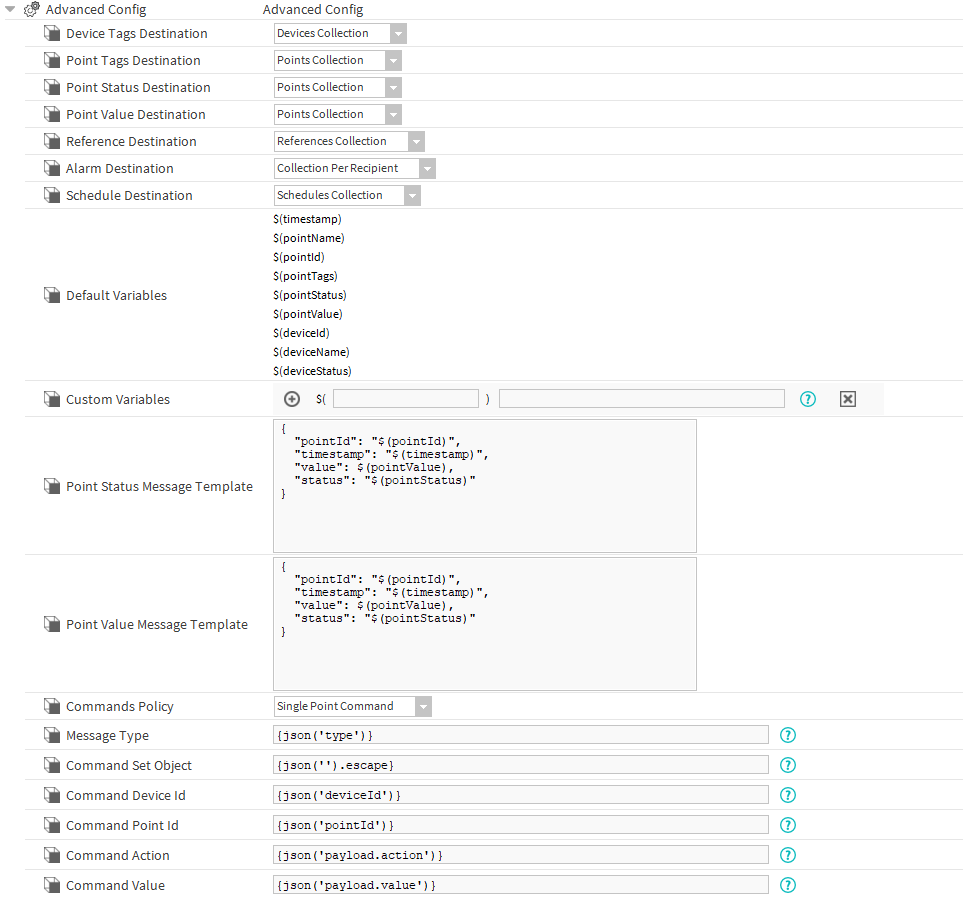Description
The RealTimeConnector is the responsible for managing the connection to the remote service.
Implementation
- Drag and drop the RealTimeConnector from the palette (btibAWS, btibIotHub, etc) to Services > Btib Service > External Connectors > Realtime Connectors.
- Fill the adequate fields. Each RealTimeConnector will have its specific fields.
- Enable the connector. It is also possible to ping the Connector to check if it works.
Properties
- Status : Connection status.
- Fault Cause : The error message status.
- Enabled : Enable/Disable the component.
- Last Attempt : Datetime of the last connection attempt.
- Last Success : Datetime of the last successful attempt.
- Last Failure : Datetime of the last failed attempt.
- Auto Provision: Create and manage devices automatically.
- Use Data Retention : Enable data retention for this connector.
- Data Retention Duration : The duration of the Data Retention.
- Data Send Retry Duration : The amount of time to wait before retrying to send data.
- Messages Thread Pool Size : The number of thread workers for message sending increment this to increment messages throughput.
Advanced Config
- DeviceTagsDestination: The destination where device tags will be sent during the initialization.
- PointTagsDestination: The destination where point tags will be sent during the initialization.
- PointStatusDestination: The destination where the point status message will be sent.
- PointValueDestination: The destination where the point value message will be sent.
- ReferenceDestination: The destination where the reference message will be sent.
- AlarmDestination: The destination where the alarm messages will be sent via the alarm recipient associated to this connector.
- ScheduleDestination: The destination where the schedule messages will be sent.
- DefaultVariables: The default variables to be used by the messages template.
- CustomVariables: Set of user defined variables to be used by the messages template.
- PointStatusMessage Template: The status message template used to construct the message to be sent by the connector.
- PointValueMessage Template: The value message template used to construct the message to be sent by the connector.
- CommandsPolicy: The commands policy either single or multi message.
- MessageType: The type of the message (Default: POINT_ACTION).
- CommandSetObject: The json format that contains the commands if the command policy is multi message.
- CommandDeviceId: The sformat path to extract the device id from the external message.
- CommandPointId: The sformat path to extract the point id from the external message.
- CommandAction: The sformat path to extract the command action from the external message.
- CommandValue: The sformat path to extract the value from the external message.
- CommandDuration: The sformat path to extract the command duration in seconds from the external message.
- StartDate: Start timestamp of the history (Optional).
- EndDate: The end date for the history (Optional).
- Delta: Apply a delta for the history (Default: false).
- RollUp: Apply a rollup for the history (Optional).
- HistoryMessageVariable: Set of predefined variables to use in the history message template.
- HistoryMessageTemplate: The template message to use for the history message.
- AlarmUUID: The sformat path to extract the uuid.
- CommandScheduleId: The sformat path to extract the schedule id from the external message.
- Weekday: The sformat path to extract the weekday from the external message.
- StartTime: The sformat path to extract the startTime from the external message.
- EndTime: The sformat path to extract the endTime from the external message.
- InvalidValuePolicy: What to do when an invalid value detected.
- InvalidStatusPolicy: Determines which out values will be filtered. Any point with a Status matching any Status in this slot won't be sent to the database.
- JsonMessagePolicy: The policy to use for value that contains json text.
Actions
- Ping : Ping the Service.
Fault Causes
- Unable to connect : Check your connection data, correct them if needed and ping the Connector again


